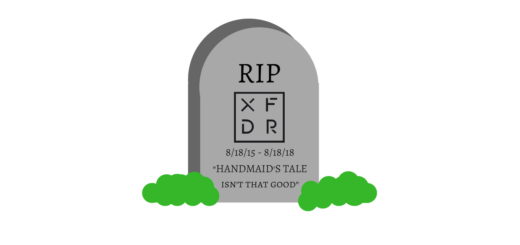The Seventh Day of Crossmas: Support Independent Media
In this seasonal series, the good people of Crossfader detail what they want pop culture to get them for Crossmas this year. This time around, it’s . . .
Supporting Independent Media
In a year of fake news and creeping fascism, it’s been incredibly difficult to figure out how to make sense of our current situation and determine what is actually true. When information travels at the speed of Twitter, it’s been nigh impossible over this past year to gain even a decent footing in reality, let alone the confidence to stand on two feet and claim to know what is factually verifiable. Sure, a lot of this confusion has to do with a man who lies more times than should be statistically possible, but it also has to do with a general population that seems incapable of parsing fact from fiction. After all, a country where Pizzagate can happen arguably has cultural problems that are much more layered than who happens to be in the Oval Office. As somebody who’s training is entirely based in fictional storytelling, it’s been hard to know what responsibility, if any, I have when it comes to commenting on the news that seems to be cracking our collective consciousness and frying it like an egg.
A common assumption among most of the people I talk to who deal in entertainment media is that the content they help to create is somehow entirely divorced from the news media and the people who produce it. This is, of course, laughably untrue, because the companies that finance the movies and television we spend so much time talking about on this website also finance the news that seems to be failing this country at every turn. The same media system that sustains IT’S ALWAYS SUNNY IN PHILADELPHIA also allows Sean Hannity to bloviate to 85% of white dads all across America. I’ve been thinking about this a lot since it was announced that Fox would be merging with Disney, meaning that an even more confusing blending of entertainment and news programming is almost certainly on the horizon. Of course, currently in the deal being brokered between the two mega-corporations, Fox News will not belong to Disney, but on a deeper, cultural level, this style of media consolidation is still deeply concerning.
Woe is us
Why is it concerning? Because Disney, specifically, is a terrifying company to own the rights to so much of this country’s most profitable Intellectual Properties. Yes, fan boys on Reddit immediately creamed their trousers over the possibility of the X-Men finally getting to appear in an Avengers movie, but let’s consider what Disney and Marvel have actually done to us, culturally. Consider the top-grossing movies of this year, out of the top 20, seven of them are Disney properties. When you include the Fox-owned properties in the top 20, it bumps them up to nine out of the top 20. This gets even more troublesome when you consider Disney’s recent history of cranking out movies that are meant to be box office success without actually appealing to the core fanbase. Disney also has a model of putting out a few sure-fire hit movies based on proven existing properties, while rarely taking risks on new stories featuring new characters in new worlds. The thing that has struck me as so painfully ironic about LAST JEDI opening this past week in the midst of the Fox-Disney merger is that it pushes Hollywood even further from being the risk-taking, innovative environment that was able to foster STAR WARS in the first place.
I’m not a STAR WARS diehard and even I’m offended by this
All of these troubling box office statistics aside, there’s a much more insidious cultural phenomenon that troubles me even further. I read a quote from David Cronenberg in the ‘90s that’s been stuck in my head ever since I first came across it: “The assumption now seems to be that every movie should be watchable by a kid . . . So the pressure on anyone who wants to make a grownup movie is enormous.” He said this in response to the increased hegemony of not only studios, but also the distribution methods of films in the video market. When Wal-Mart and Blockbuster had become key players in the overall financial success or failure of a movie, refusing to carry movies that were not sufficiently within their definition of “family friendly,” directors and creatives of all types suddenly felt limited in the type of art they could make, at least on a mass, popular level.The thing that especially troubles me about this quote is that it was made roughly around the time I was born, and it leads to a pretty frightening question: what happens to a generation raised on so much content that perpetually treats them like children?
It’s not hard to recognize that millennials seem to be peculiarly strangled by a constant sense of arrested development, a fear and an unwillingness to become autonomous adults.This is largely due to an economy that seems to steadfastly refuse to adapt for us to have our employment, housing, and healthcare needs met, which leads to a dependency on our parents that lasts well into our early 30s. This leads to a sense that we don’t fully see ourselves as adults, that we somehow exist in a gray area where independence (and the responsibility that comes with it) is a hazy concept to be dealt with in the distant future. As a result, it’s felt for a long time like our media, particularly our movies, television, and news, have become infantilizing to an alarming degree. I’m not saying that you’re not allowed to enjoy Marvel, Star Wars, Game of Thrones, and Harry Potter, but for the love of God, they can’t be the entirety of the fiction we consume to help develop our worldview. We deserve media that treats us like adults, and the fact that our box office and our televisions are about to become dominated by a company that long ago decided “fun for the whole family” was the only business model they wanted to pursue should leave you uneasy. When one mega-corporation with one specific goal is dominating so much of our narrative programming with simplistic fantasies from our childhood, it’s no wonder that so few of us seem to have any idea how to make heads or tails of the complex, immediate, moral crises we’re being forced to confront in our current political climate.

Perhaps taking our political commentary from a woman who writes children’s fantasy novels was a bad choice
There’s also a more sinister element on the creative side of things when it comes to media financing decisions being concentrated into so few corporate hands. Inevitably, those artists are forced into incredibly difficult compromises. The most harrowing example of this is Salma Hayek’s brutal tale of her abuse at the hands of Harvey Weinstein so that she could make the exceptional film FRIDA. In the wake of the onslaught of sexual assault and misconduct allegations against powerful men in media this year, it should be abundantly clear that creating a world where a few powerful men can make or break a person’s dreams isn’t a healthy environment for anybody to create things. What’s even more disturbing is that, at one point, Harvey Weinstein was the bold alternative to the traditional studio system for “quality, sophistication and risk taking—a haven for artists who were complex and defiant.” (Funnily enough, Miramax was actually owned by Disney in the ‘90s.) We don’t have the Weinstein Company anymore (thank God), but before too long we may not have Fox Searchlight, the branch of Fox that, as Todd VanDerWerff at Vox put it. “was at least trying to make movies for grownups.” I’m not saying that anyone at Fox-Disney will be a Weinstein-level psychopath, but what I am saying is that we’ve seen an even greater tightening of the places where people can go to make movies for grown ups, and the few people who are willing to take the risks to finance movies like FRIDA will have similar leverage over artists that Weinstein had over Salma Hayek.
I know, this has been a lot of hand-wringing and Scrooging for an article supposedly about optimistic Holiday wishes for 2018, but I really do have a pretty clear wish for this upcoming year. If you’re reading this, please consider stepping outside of the studio system, at least every once in awhile, as you seek out and consume new, independent content. There is absolutely nothing that you or I can do to stop Fox from fusing with Disney to become one awful ball of hyper-capitalism, but we can change the way we interact with and consume our media. I used to be anti-piracy, but I really can’t say I care anymore—fuck it, steal from Disney, torrent THE LAST JEDI tonight. I’d love if people stopped going to Disney’s movies quite so often in general, but I know a lost cause when I see one. My wish isn’t really for people to stop participating in pop culture entirely, but rather to start finding alternative, independent forms of media to actively support as well.
The only way I can see to get around this entire mess of media consolidation is to pay the people making good art directly. We came of age under this nebulous sense that everything on the internet would be free and instantaneous forever, but it’s quickly become apparent that that approach isn’t sustainable. Spotify is crushing musicians, YouTube can’t figure out how to hold onto advertisers without undercutting creators, and Twitter just cannot make money. Furthermore, the websites DNAInfo and Gothamist were shut down suddenly and dramatically this year after an attempt to unionize their writers, and the LA Weekly was bought up by a bunch of real estate investors who fired the majority of their staff. More than just movies and TV are at stake here, as independent, locally-focused journalism continues to be under attack as well.
Luckily, there are very easy ways you can start backing content creators and get past media hegemony entirely. Patreon is genuinely a great platform to support people making good stuff with limited outside influence—the most successful podcasts of this year use Patreon and I see no reason why the platform couldn’t sponsor more creators going forward. The great thing about their model is that a relatively small amount of people making $5-a-month donations can sustain most artists extremely well. You don’t have to donate to every podcaster, YouTuber, and writer you enjoy, just your absolute favorite. Similarly, Bandcamp is a great platform for supporting musicians directly, and luckily, we have a whole series of articles devoted to recommending Bandcamp musicians. And when it comes to independent journalism, there really are a whole schmorgesborg of options out there. For film, I can’t recommend going to independent film festivals enough. Some of the best film-going experiences I had this year were going to festivals, watching films made on shoestring budgets, and then listening to Q&As with the directors afterwards. If you live in or around any major city, you can go to see these movies and support those directors.
We’re not going to make a dent in Disney’s profits doing all this, but we can show other artists that there are viable alternatives to begging major media conglomerates to give them money. And again, it’s not about stepping away from participating in pop culture entirely, just about showing your financial support to the people who actually need it the most. I have no idea if this will actually solve our problems, but I don’t like to dwell on what will happen if we just let ourselves go on like this.



